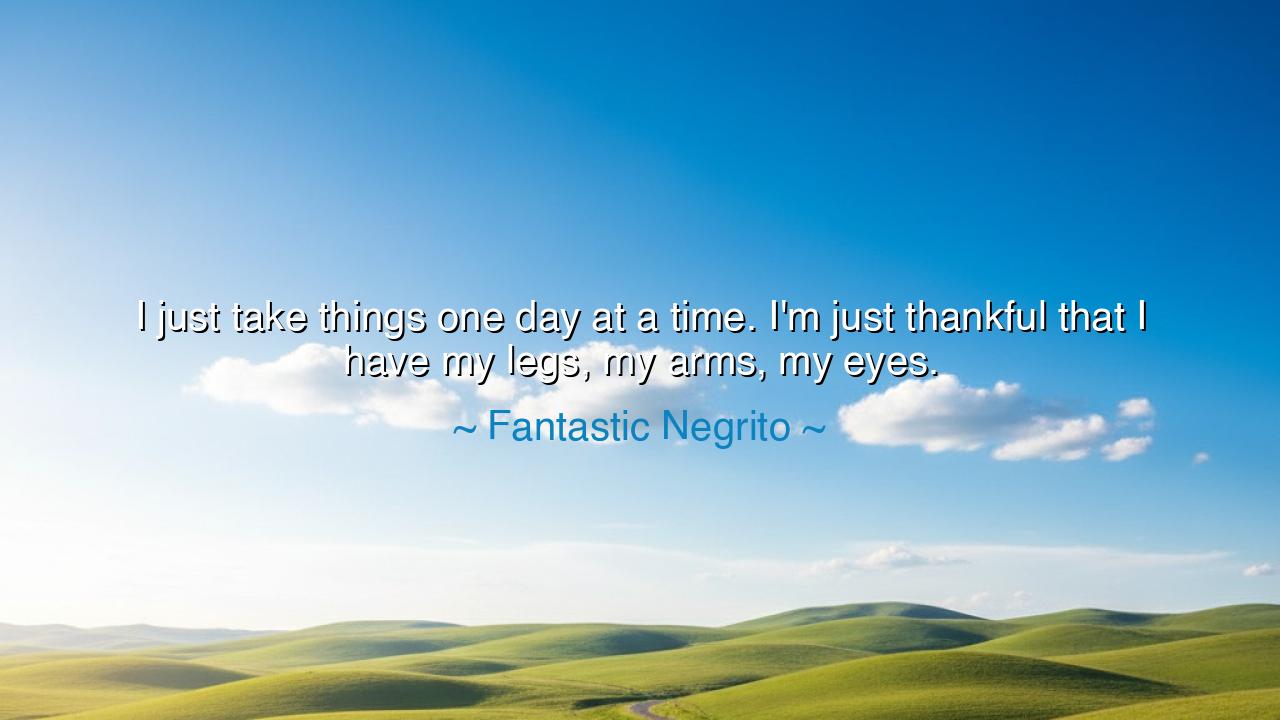
I just take things one day at a time. I'm just thankful that I
I just take things one day at a time. I'm just thankful that I have my legs, my arms, my eyes.






The words of Fantastic Negrito rise from a place of struggle, survival, and hard-won clarity: “I just take things one day at a time. I’m just thankful that I have my legs, my arms, my eyes.” Here speaks a man who has seen life stripped to its barest essentials, who has faced trials where even survival itself was uncertain, and who has emerged with the wisdom that the simplest blessings are the greatest. His voice is not adorned with the vanity of wealth or fame, but rooted in the humility of being alive, whole, and present in this very moment.
To say “one day at a time” is to acknowledge the fragility of life. It is to live as the Stoics once counseled, aware that tomorrow is not promised, and that today must be lived fully, with patience and acceptance. Negrito’s gratitude for legs, arms, and eyes reveals the profound truth that even when the world seems to have collapsed, the body itself—the vessel of our being—remains a miracle worthy of thanks. In a culture that often glorifies abundance, he draws us back to the foundation: the simple power of breath, movement, and sight.
His words are born from his own story. Fantastic Negrito survived a near-fatal car accident that left him in a coma, with doctors doubting he would ever walk again. Out of this brush with death, he came to see life not as a promise of endless victories but as a fragile flame, one that must be cherished with every step. This is the origin of his gratitude, the soil from which his music and wisdom spring. Like the phoenix of old, he rose from ashes, and his song became not one of despair but of thanksgiving for what remained.
History echoes with such examples of men and women who found greatness in simplicity. Epictetus, born a slave and crippled in body, declared that true freedom lay in controlling one’s mind, not in possessions or circumstance. Helen Keller, blind and deaf, yet thankful for the touch of a hand and the guidance of a teacher, turned her limitations into inspiration for millions. Their lives, like Negrito’s, remind us that gratitude is not born from having everything, but from recognizing the pricelessness of what we already have.
Negrito’s words are also heroic because they defy despair. To be thankful in abundance is easy; to be thankful when the body itself has been tested, when survival was uncertain, requires courage. His declaration is a victory song: that even if stripped of acclaim or riches, he still stands, walks, and sees. In that defiance lies true resilience, for he refuses to be defined by loss and instead exalts what remains.
The lesson here is profound: each of us, no matter how heavy our burdens, carries treasures often overlooked. Legs to walk, arms to embrace, eyes to see the dawn—these are miracles greater than crowns of gold. Let us not waste our lives in constant hunger for more while ignoring the gifts already within us. Gratitude for the body, gratitude for the day, gratitude for the breath—these are the foundations of joy.
Therefore, let us act. Begin each morning by counting the simple blessings: the ability to move, to see, to feel, to breathe. Live one day at a time, refusing to be consumed by the weight of past regrets or the shadow of future fears. And when hardship comes, remember Fantastic Negrito’s wisdom: if you have your body and your senses, you have enough to rise again, to rebuild, to continue. For the wisdom of his words is eternal—that the greatest riches lie not outside us, but in the simple miracle of being alive, whole, and present in this moment.






AAdministratorAdministrator
Welcome, honored guests. Please leave a comment, we will respond soon